A Normal Woman Synopsis
Released on July 24th by Netflix, A Normal Woman is a Thai psychological thriller directed by Lucky Kuswandi, who also co-wrote the script with Andri Cung.
Marissa Anita plays Milla, Dion Wiyoko plays Jonathan Gunawan, Widyawati plays Liliana Gunawan, and Mima Shafa plays Angel.
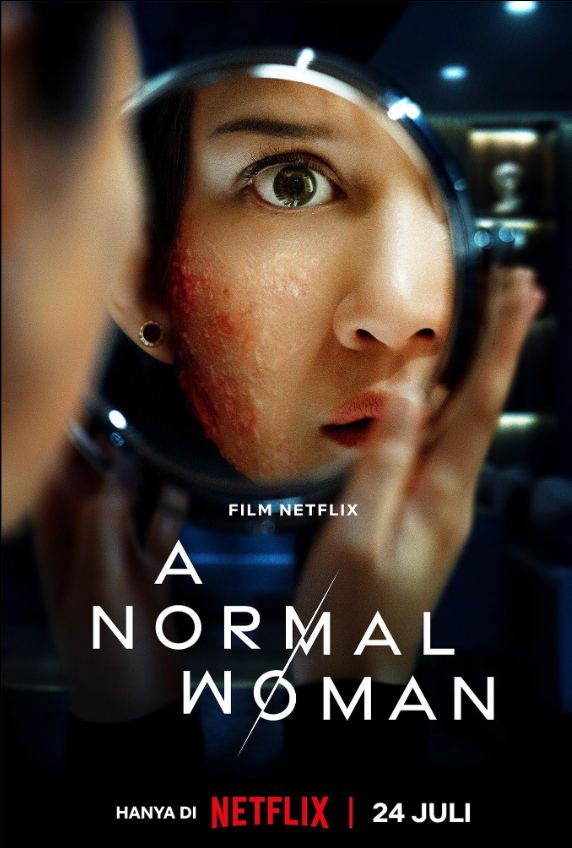
The plot follows Milla, a beautiful socialite who has everything many dream to have. An important husband, a lovely daughter, wealth, prestige, and a cover-worthy family. However, this perfect façade starts falling apart when Milla becomes ill with a mysterious skin disease that doesn't seem to have a cause or cure.
As the symptoms get worse, she starts hallucinating and losing the grasp on what's real and what's only in her mind.
At the center of this physical and psychological collapse is another person: Grace. Milla obsessively believes Grace is the key to unraveling the enigma behind her condition and, perhaps, herself.
A World Based on Appearances
From the beginning, you can tell this movie directly criticizes "keeping up appearances", either physically, emotionally, or socially. It explores the pressure to appear perfect: how we act and how others expect us to act. And, mostly, how obsessively controlling how we are perceived can slowly strangle us to death.
Straight away, we see Milla waking up in the early hours of the morning to get ready and take care of the house. She needs to do this before a group of journalists arrives to take a picture of her "perfect" family for the cover of a variety magazine. However, we soon realize her family may seem in harmony, but it is just a disguise. A subtle yet enlightening example of this is when her employees replace the flower arrangement she picked for another her mother-in-law, Liliana, picked.
Later on, during the family shoot, a big flower arrangement is covering Liliana's face. Milla suggests moving the arrangement, but the mother-in-law tells the photographer to just change the angle of the camera. The result? Angel, Milla's adolescent daughter and Liliana's granddaughter, disappears from the picture. We also soon understand why: Angel doesn't fit the aesthetic the family and, by extension, society subscribes to.
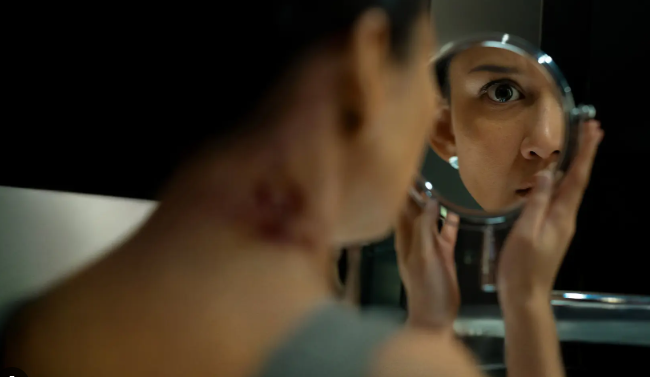
In Milla's universe, everything is about appearances. The family needs to be untouchable, and their faces, impeccable. Even if that means the granddaughter has to go through plastic surgery very young and reshape her body to fit other people's standards.
This stifling environment is also represented in the aesthetics of the movie: the main home is dark, marked by cold colors and tight corridors. Milla goes through this labyrinth every day, even before the sun comes up, and tries to make everything "perfect" before her mother-in-law finds something to criticize.
An interesting detail is how precise the art direction is. The color palette, the stiff furniture, the straight lines and neutral tones, it all makes us feel even more trapped inside this house. The architecture echoes the main concept of the movie: perfection is a prison. The production definitely earned their pay for that.
An Enviable Family With No Place for Anyone
Once again, the movie highlights how everything around Milla is so frivolous: nearly all comments directed at her have something to do with her beauty. Reduced to a shiny shell, she is treated as an ornament, meant to be admired but empty.
Milla's entire life is about keeping her house immaculate, pleasing her mother-in-law, pretending to be a trophy wife, and shooting ads with her husband, all under the lens of a perfectly manicured life.
In the rare moments she leaves the house (for instance, when she goes to the club her husband's social circle frequents), she has to hear from her "friends" how wonderful, beautiful, and a true prize her husband is. As if she is only the lucky one he gets to parade around and not a woman with a life of her own. And even when she sees one of the ladies coming on to her husband, she needs to smile elegantly. After all, that's what's expected of a polished, high-society lady.
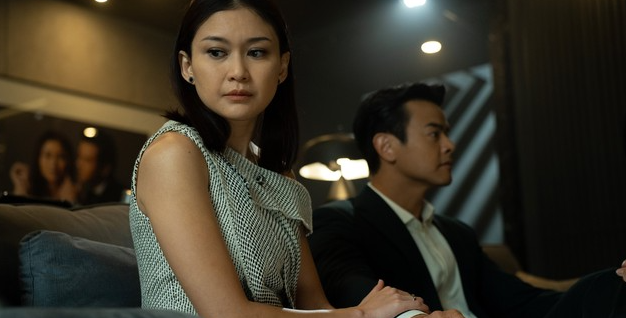
But, inside, she's bleeding. Literally. This stifling atmosphere results in another stress-related crisis: Milla self-harms and slashes a gash on her neck, a silent act of desperation that will become, further on, a crucial part of the narrative.
In this mansion built on appearances and thin porcelain, the only small moments of humanity Milla gets to have are with her daughter, Angel, her cook, Irah, and her gardener, Hatta. They're the only ones that see beyond the surface, albeit briefly.
Everything around this beautiful woman has to be so controlled, calculated, and "perfect", that it is as if she is a mismatched jigsaw piece, trying to wear shoes that don't fit and hurt her whenever she takes a step. And, the most tragic of all: she can't find peace even among her own flesh and blood because her mother is also estranged from her, shallow, and unreliable.
It's no surprise her disease ravishes her skin and mind. Milla's illness is physical, yes, but it has much deeper roots. It sprouts from unresolved past trauma, an ancient agony.
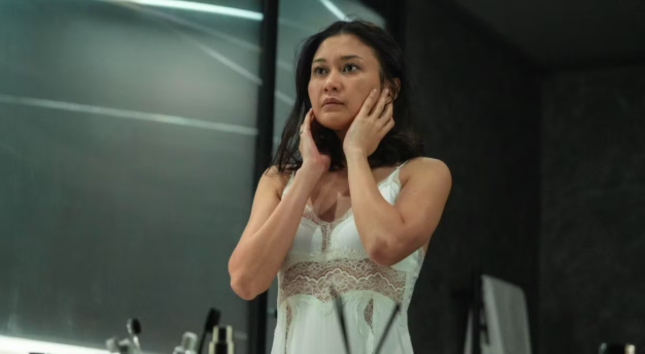
The Manchild
Of course, we have to talk about Jonathan, Milla's husband, a character who embodies, with uncomfortable precision, the "manchild" archetype. A man who never grew up.
Jonathan is the typical son who lives in his mother's shadow, protected by a gilded cage ever since he was born. He never had to take a stand and was never taught or had permission to grow up. He's a middle-aged man with the emotional intelligence of a spoiled, vain, successful yet empty teenage boy.
Liliana, his mother, is the epitome of control. She is the one who lays down the rules, the standards, and even the flowers that go on the table. Jonathan, like a well-dressed puppet, just obeys her.
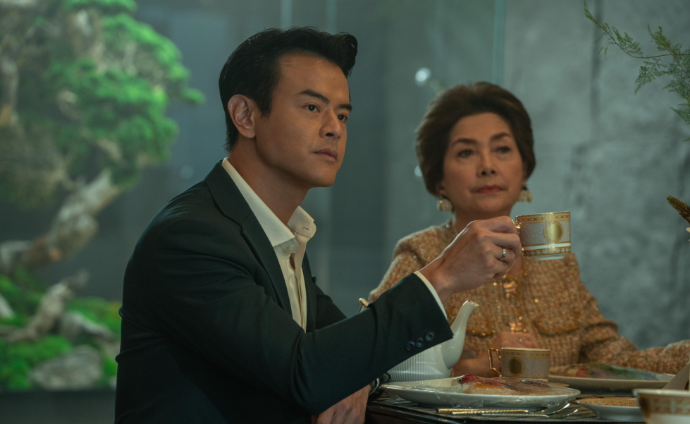
When Milla most needs support and protection, someone who sees her beyond her looks, Jonathan disappears. And the moment she doesn't fit the "perfect woman" mold, when she gets sick and her beauty fades, he simply discards her. Like a kid who got bored of an old toy.
Jonathan is easily manipulated, either by his overprotective mother or by any deceitful woman who knows how to control him. He lives in a theater of perfection but doesn't know how to deal when things run off-course. And it's precisely this family dynamic, this well-polished façade, that makes everything even more horrifying: on the outside, the family is perfect. Inside, the cracks are wider than ever. A house that isn't a home. A marriage without partnership. A father without a voice.
The Unpleasant Daughter
The movie makes pretty clear to us, the viewers, how Liliana despises everything she considers "ugly", and this judgment shamelessly starts with her own granddaughter.
From the incident with the magazine shoot to when Angel, who is being bullied online, confesses to her mother that her grandmother wants to pay for plastic surgery for her. We can feel how heavy these generational beauty standards weigh on her shoulders.
Milla's reaction is intense and, later on in the movie, becomes even more complex. The pain goes beyond momentary indignation.
When confronted, Liliana says "Angel isn't pretty" and insists Milla wouldn't like to see her daughter suffer because of her looks.
And here's what makes everything even more wicked: Angel is just a normal teenager. She is a little overweight, has a round face, a wide nose, and acne. She is just a regular girl. Like so many. Like most.
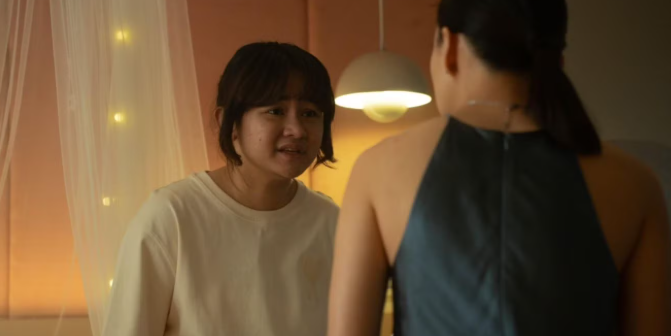
However, in this reality, where filters and online performance shape our perception, being common is a flaw. "Natural features" are an abomination.
Liliana isn't just a cruel mother-in-law. She is the living incarnation of what social media whispers (or rather yells) to us every day: you're not enough.
Be thinner. More symmetrical. Marketable.
Liliana's exposition is the human echoe of what the algorithm throws at our face relentlessly: you can only be beautiful with expensive procedures, important serums, miraculous creams, and perfect makeup. Never as you are. Never without help from the beauty industry.
And the scariest part of it all is realizing how this is taught as an act of love. As if mutilating your own identity was a way to protect yourself.
Liliana wants to shape Angel into an ideal version of herself not because she hates her but because she believes she is saving her granddaughter from a world that punishes you for being different. And those "good intentions" make everything even worse.
It's Not The Flower
In the second half of the movie, Hatta, the gardener, plants the most precious seed inside the plot: a simple reflection, but that many, like Milla, take a while to see. Or don't want to see.
Occasionally, what is making us sick is not inside of us. It's around us. It's in the environment we choose to live in, shape ourselves into, and fit into.
How many times do we force ourselves to stay in places we believe to be the "best for us" but that, actually, only drain our energy? That don't really let us shine, and instead, slowly ruin us?
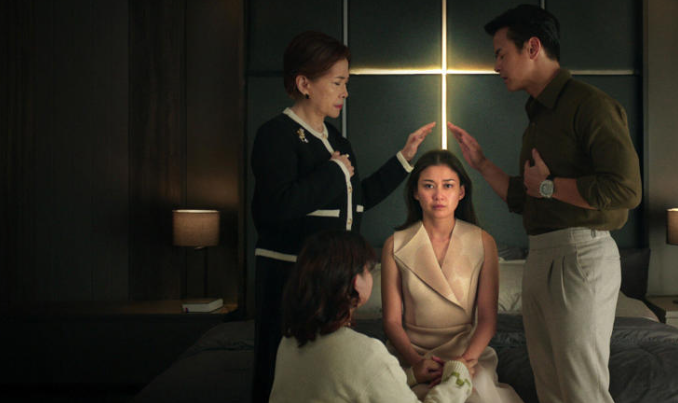
Will that place (that home, relationship, social circle) really make us flourish? Or are we just withering away in silence, day after day, trying to fit somewhere that doesn't have space for who we really are?
Healing, sometimes, starts when we find out where the illness is coming from. And when we then decide to leave that place.
Leaving that place means finding ourselves again. Taking care of us. And occupying places where we are welcome without having to change ourselves or bleed.
Because choosing ourselves isn't selfish. It's survival.
Grace's Face
When Milla finds out about Grace's past, when the truth finally comes to light, she understands, without a question, what her husband and mother-in-law really care about: control and perfection. Everything that doesn't meet this untouchable standard has to be isolated. Forgotten. Replaced.
At this moment, Milla understands she no longer belongs to that family, nor wants to be. She realizes all she ever wanted was to be free. She wants to be free not of the responsibility but of the prison disguised by luxury and obedience.
She wants to be free of the silent prison that is living according to Liliana's standards. Liliana, who mistakes protecting her family with selling an inhuman, unreachable, unrealistic image.
All Milla wants is a simple life: her feet on the ground, wind on her face, flowers in her hair. But they gave her a mirror who always asked for more and never reflected who she was, just who she had to be.
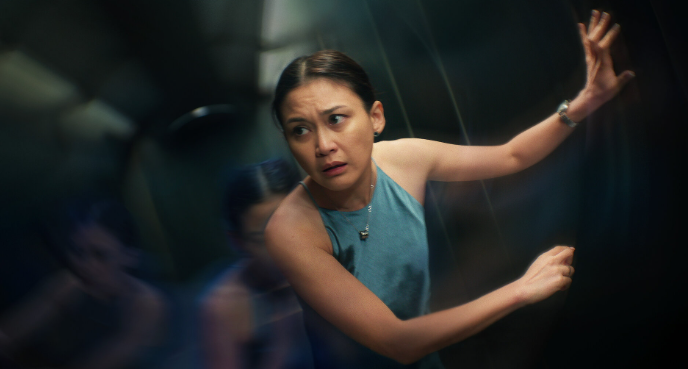
When Grace's face and Milla's memory were stolen, their lives changed completely. It gave them fates they'd never have chosen otherwise. And, when the truth came out, Milla didn't get any support.
She was blamed. By her mother-in-law, whom she always tried to please. By her husband, whom she always supported. We have to ask ourselves: why did she sacrifice herself that much? Why did she suppress who she was that much?
In the end, for them, Milla was nothing more than a pretty face. And, when that face started to crack and lose its shine... She was no longer a person. She became a mistake. A body to be discarded.
But perhaps it was then, precisely then, when the cracks started widening, that the real woman behind that face was born. Not the perfect woman, but the one who can actually recognize herself.
A Beauty
From very early on, the script presents a complex mystery to us: what is happening to Milla? Why did she become sick with this bizarre illness? And what do her hallucinations have to do with all of this? The movie builds this tension and holds our attention pretty well until the pieces start falling together.
Visually, it is quite pleasant as well. The photography leans on sober tones that make the atmosphere of the narrative claustrophobic. From time to time, what's real and what's in Milla's head is quite clear, which could be considered a bit anti-climatic, considering this movie genre benefits from ambiguity. Still, this doesn't compromise the entire experience.
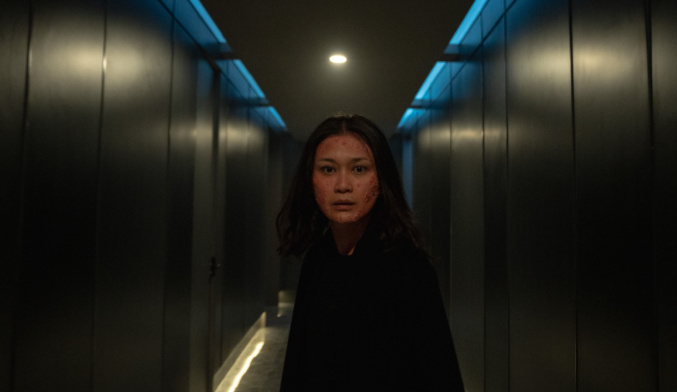
Nonetheless, the symbolism in this movie is excellent at times. Milla's injured feet represent the constant discomfort of living somewhere you don't belong. The dark walls of the mansion represent the emotional prison she lives in. The soft lighting in Angel's room represents the last traces of tenderness in the entire house and how that's Milla's last safe haven. And the scorpions in Liliana's soup, despite being part of a hallucination, are direct metaphors for the emotional poison that contaminates Milla's mind.
These small details make the story richer and build a narrative full of meaning. The visuals speak even when no one says a word.
Not That Great
Some lines, like Hatta's in the garden, sound a bit too on-the-nose. Reflecting on the message of the movie is important, but the delivery could be more subtle and metaphoric. At that point of the movie, we, the viewers, already understand what is making Milla sick. Stating the obvious insults the intelligence of the viewers.
The movie also didn't develop the supporting characters all that much, and this is a bit annoying. Jonathan, for instance, is reduced to three traits: vain, spoiled, and dependent on his mother. We know he is emotionally immature, but the script doesn't expand on that. This means Milla, a rich and complex character, paired up with a shallow man, which raises a question: what did she see in him? We needed this relationship to have a few more layers, particularly when it comes to Jonathan.
Angel's final decision also sounds illogical. After everything she sees, her choice to remain in that toxic environment seems forced. The script tries painting this as a sign of maturity, but, in practice, it just sounds immature. It doesn't seem to make sense for this character. It is just a way to disrupt the plot.
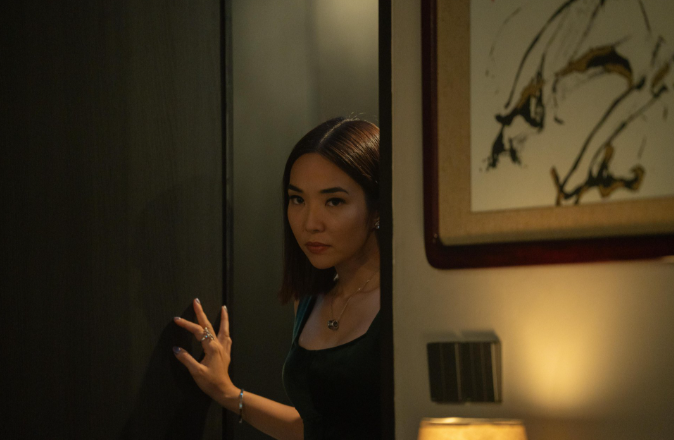
Erika, the key character in the final act, comes up rather out of nowhere. Her introduction makes it seem like Jakarta is a small village where people meet again on accident, which is not that realistic. It would be more interesting if Erika was introduced gradually, popping up in flashbacks or moments with Grace, building her character more organically.
The script also briefly touches on religious obsession but soon abandons this theme without exploring it properly or adding anything to the story. This theme wasn't properly resolved, and it would have been more honest to leave it out.
Lastly, the criticism towards obsessive beauty standards, despite valid, is excessively obvious. The movie could have explored questions like Liliana's hatred with more elegance, revealing it in glances, silences, or ambiguous lines. Instead, we get obvious, wide open plotlines. The entire story loses subtlety by being so straightforward.
Is It Worth a Watch?
A Normal Woman is another movie with an excellent theme, but that could be a lot better. With more symbolism and less explaining, the plot could have given us deeper debates and multiple ways to interpret identity, aesthetics, and power.
Still, if you're looking for a movie to watch on the weekend that offers something beyond the very basic action Hollywood stories, A Normal Woman is worth a watch.
So, are you curious? What sort of illness does Milla have? Who is Grace after all? And Liliana, is she worse or better than your mother-in-law?
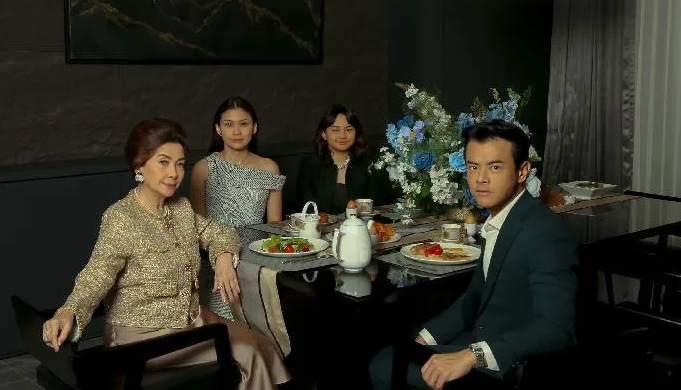












— Comentarios 0
, Reacciones 1
Se el primero en comentar